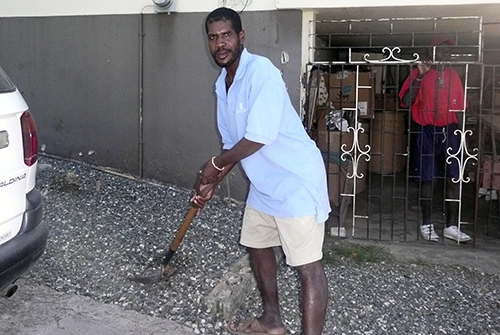Early one morning in 2002, Frederick Kelly left home in St. James and set out to work on a construction site in St. Ann, as he did many mornings before. This morning, however, was different. He suffered a mental breakdown and for weeks, or possibly months, he roamed the streets, eventually making his way to St. James. To this day, he has never returned home.
This is the theory posited by Nurse Joy Crooks, Mental Health Nurse and one of the founding members of the Committee for the Upliftment of the Mentally Ill (CUMI), having treated Kelly for the past 15 years. CUMI is one of the few organizations in the country which tend to the needs of mentally ill persons who have been displaced, or whose families simply cannot afford to care for them.
Kelly’s story began in 2002, after a concerned citizen saw his state and made contact with the Cornwall Regional Hospital (CRH). A dehydrated, confused and mute Kelly was then picked up, his head, bound with barbed wire, during episodes where he tried to silence the voices he was hearing in his head. His feet were swollen from walking hundreds of miles to St. James; and his lips were white from lack of water and food. Kelly remained on the psychiatric ward at the CRH for two years before he was handed over to CUMI to continue his treatment, as no family members could be located.
Crooks said, “When [Kelly] came [to CUMI], he was not coherent or able to give rational answers. It took many years to regain his speech. He put wires really tight around his head and those wires stared to grow into the skin and the skull; and it took a long time to heal after slowly removing the foreign bodies. He had many years of therapy to understand why he needed to take his medication. He can’t remember everything from his past but now he can express himself…and we can trust him to do daily errands for us such as paying utility bills, and taxes.”
FIFTEEN YEARS LATER
Today, 15 years later, Kelly is now CUMI’s bearer and gardener. After months of therapy, Kelly began to speak again, and after a few years, began to read and write. He remembers that he has two children, but cannot recall as yet, their names.
“I like CUMI a lot,” Kelly says, “I clean up the yard and I pay the bills downtown and I like to work with Miss Joy.”
“Frederick is quite bright. He plays quiz, bingo and he can read and write. All these things have come back since he has been stable,” Crooks added.
Kelly is one of the lucky ones; he sleeps at the Refuge of Hope Night Shelter and attends CUMI daily. Other mentally ill persons, however, are left to roam the streets, without help. CUMI intervenes when it can, but today struggles to keep its doors open, as its operating costs continue to rise.
To provide food, clothing, medication, therapy, and the general operational costs for the organization to stay open is about approximately $6 million each year, and they receive very little support from the government.
Each year, CUMI hosts its major fundraiser, the CUMI Come Run with the support of Running Events, the Tryall Club, and a host of corporate sponsors.
On September 21, the 11th CUMI Come Run will be held at the Tryall Club starting at 6:30am. This year, CUMI is hoping to raise $4 million to bolster its trust and looks forward to the support of as many persons to help to reach this goal. Registration is now open for persons to sign up online at runningeventsja.com.




Thank you for your blog post.Really thank you! Great.
Asking questions are really nice thing if youare not understanding something completely, but this post gives good understanding even.
There’s definately a lot to know about this subject. I like all the points you made.
Wow, incredible weblog layout! How long have you ever been running
a blog for? you make running a blog glance easy. The total
glance of your website is excellent, as neatly as
the content material! You can see similar here najlepszy sklep